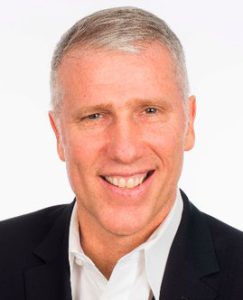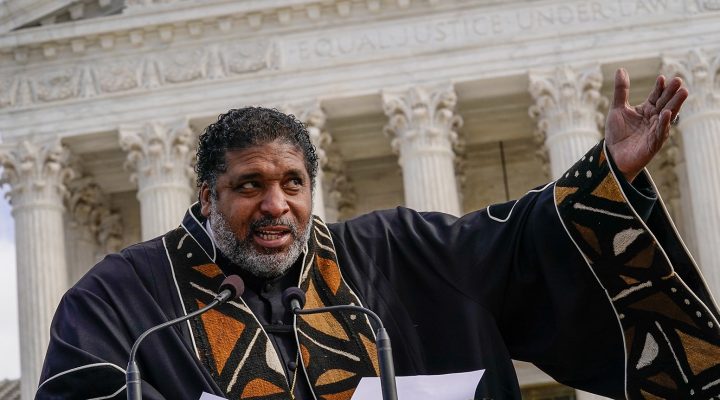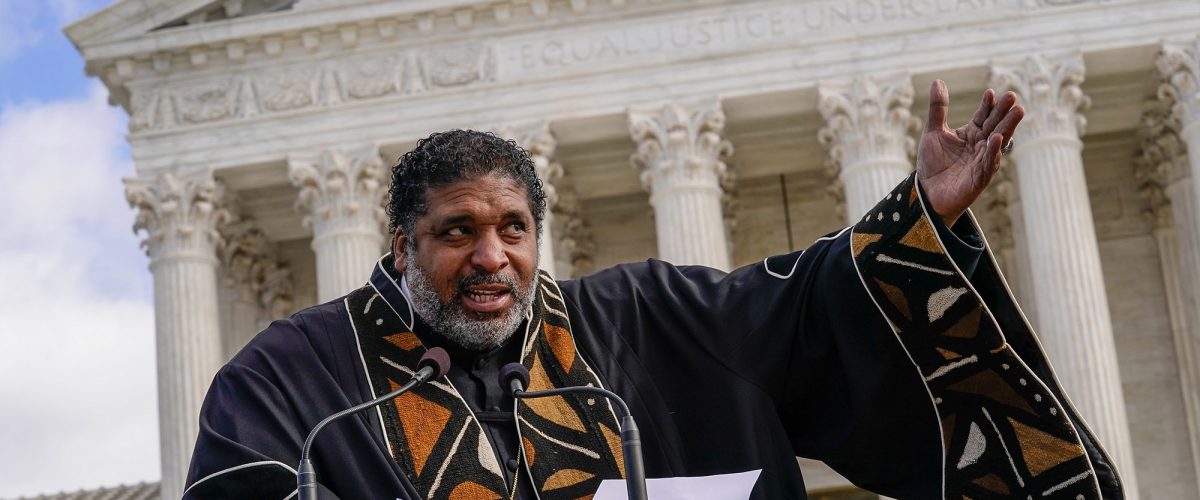Christian nationalists oppose the teaching of Black history and Critical Race Theory out of fear the subjects could spark compassion for marginalized people, civil rights leader William Barber II said during a radio show hosted by Interfaith Alliance.
“The forces that don’t want to look at history … are afraid of hearts being changed. I think there are people literally afraid of the history being taught in a way that it will call people to see what’s going on and why it needs to be changed,” Barber said in his “State of Belief” interview with moderator and Interfaith Alliance President Paul Raushenbush.
Barber said “anti-woke” legislation banning books and teaching on racial history usually is couched as efforts to prevent white people from feeling offense, guilt or discomfort. “They’re not only afraid of being offended, but about being driven to repentance.”
Barber is founding director of the Center for Public Theology and Public Policy at Yale Divinity School, co-chair of the Poor People’s Campaign — A national Call for Moral Revival, and is perhaps best known for organizing the Moral Mondays protest movement in North Carolina. Earlier this month, he retired from Greenleaf Christian Church in Goldsboro, N.C., after a 30-year tenure.

Paul Raushenbush
During part of his hour-long conversation with Raushenbush, Barber delved further into the “anti-woke” tactics he said are used by Christian nationalists to subjugate the disenfranchised while grabbing for increased political and economic power.
Prohibiting public schools and colleges from teaching racial history or using diversity-in-education programs also are attempts by right-wing politicians to divert attention away from their failed policies, Barber asserted.
Florida Gov. Ron DeSantis is “a master of deflection” in using such legislation to direct focus away from poverty in his state, the pastor said. “He doesn’t want folks to talk about that because they would then put him out because his policies haven’t done anything about that. … So, what does he do? He deflects on AP courses in Black history and tries to ban books. … But all of that is a deflection because he knows if the people really examined his policies over and against our deepest constitutional values, and our deepest moral religious values, and over against the damage his policies have done to everyday people, they won’t accept his leadership.”
But there is cause for optimism, Barber said. “As I move across this country and I see people from the hills of West Virginia to the Delta of Mississippi, to California, to the Carolinas, to Kentucky and Kansas — all over there is something rising. There’s a stirring in the valley of dry bones, if you will, a kind of resurrection of the spirit of justice and love and Jesus.”
That stirring manifested last year when the Poor People’s Campaign held a rally near the U.S. Capitol to call attention to the suffering of low-income and impoverished Americans. Thousands attended. “Over 25 religious denominations came together with the poor on Pennsylvania Avenue to say to this nation, ‘For your sake, for the soul of this nation, address systemic poverty.’”
Turnout also was encouraging during a recent fair-wage tour with U.S. Sen. Bernie Sanders in Tennessee, North and South Carolina. “He asked me to go on a three-state tour to talk about living wages as a moral issue,” Barber said of the former Democratic presidential candidate. “The audiences were packed.”
“They just don’t want to be a part of the religion of injustice.”
The diversity present at these events was encouraging, he said. “White folk, brown folk, Latino folk, gay folk, straight folk, young folk. And I was amazed at the number of young folk. … Listen, they just don’t want to be a part of the religion of injustice.”
Barber said he shares that desire and is disturbed by “so-called evangelicals” who conflate Christianity and the Republican Party to oppress Black, LGBTQ and impoverished people while seeking greater gun rights and tax cuts.
“The party is not evangelicalism. That is another attempt to hijack the faith and use the faith in the service of injustice and meanness and racism and homophobia and xenophobia and all those things.”
He urged: “It’s our time to stand up and to be counted among those who care for love and justice and righteousness. What I’m saying to people of faith is that our faith was born for this. Faith is born for standing up in the tough times, and there’s always a need for a prophetic movement.”
If people of faith were to actively oppose those hijacking Christianity, the effect would be immense, he added. “What if you have the power to bring a political Pentecost into reality? What if it’s not about Democrat or Republican, but about our faith, about who we are as people?”
Raushenbush cautioned that the time to act may not be open very long.
“We are up against a very well-funded, coordinated and intentional effort to take religion from the people and use it as a force for nationalism, for violence, for greed,” he said. “We are at one of those moments where America is going to make a decision, or a decision will be made for us.”


